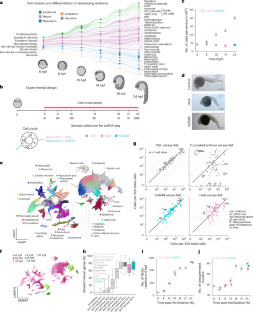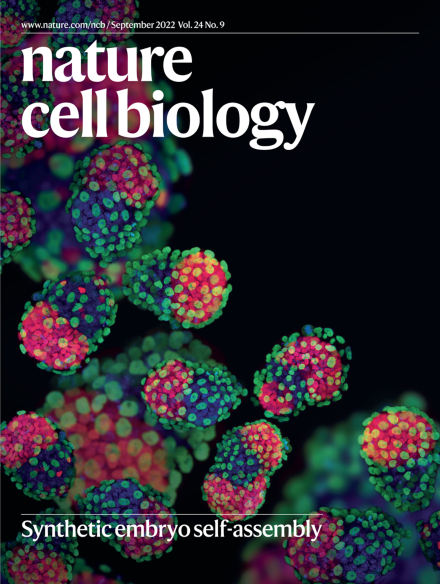早期胚胎发育过程中细胞状态转换与细胞分裂脱钩
IF 17.3
1区 生物学
Q1 CELL BIOLOGY
引用次数: 0
摘要
随着组织的发育,细胞分裂和分化同时进行。相互矛盾的证据表明,细胞分裂对于细胞类型的形成要么是可有可无的,要么是必需的。在这里,为了确定细胞分裂在分化中的作用,我们采用两种独立的方法阻止了斑马鱼胚胎的细胞周期,并以单细胞分辨率对其进行了分析。我们发现,细胞分裂对于从早期胚胎发育到分节末期的所有胚胎组织的分化都是不可或缺的。然而,阻止细胞分裂确实会减缓某些细胞类型的分化,而且会诱发整体应激反应。虽然分化对细胞分裂的阻断是稳健的,但不同细胞状态的细胞比例却并非如此,而是显示出部分补偿的证据。这项研究澄清了我们对细胞分裂在发育过程中的作用的理解,并展示了将全胚胎扰动与单细胞 RNA 测序相结合来揭示跨多个组织的共同生物过程的作用的实用性。本文章由计算机程序翻译,如有差异,请以英文原文为准。


Cell state transitions are decoupled from cell division during early embryo development
As tissues develop, cells divide and differentiate concurrently. Conflicting evidence shows that cell division is either dispensable or required for formation of cell types. Here, to determine the role of cell division in differentiation, we arrested the cell cycle in zebrafish embryos using two independent approaches and profiled them at single-cell resolution. We show that cell division is dispensable for differentiation of all embryonic tissues from early gastrulation to the end of segmentation. However, arresting cell division does slow down differentiation in some cell types, and it induces global stress responses. While differentiation is robust to blocking cell division, the proportions of cells across cell states are not, but show evidence of partial compensation. This work clarifies our understanding of the role of cell division in development and showcases the utility of combining embryo-wide perturbations with single-cell RNA sequencing to uncover the role of common biological processes across multiple tissues. Kukreja et al. show that blocking cell division in zebrafish does not affect differentiation of major cell types during gastrulation and segmentation, but it does decelerate differentiation of particular cell types and skews their proportions.
求助全文
通过发布文献求助,成功后即可免费获取论文全文。
去求助
来源期刊

Nature Cell Biology
生物-细胞生物学
CiteScore
28.40
自引率
0.90%
发文量
219
审稿时长
3 months
期刊介绍:
Nature Cell Biology, a prestigious journal, upholds a commitment to publishing papers of the highest quality across all areas of cell biology, with a particular focus on elucidating mechanisms underlying fundamental cell biological processes. The journal's broad scope encompasses various areas of interest, including but not limited to:
-Autophagy
-Cancer biology
-Cell adhesion and migration
-Cell cycle and growth
-Cell death
-Chromatin and epigenetics
-Cytoskeletal dynamics
-Developmental biology
-DNA replication and repair
-Mechanisms of human disease
-Mechanobiology
-Membrane traffic and dynamics
-Metabolism
-Nuclear organization and dynamics
-Organelle biology
-Proteolysis and quality control
-RNA biology
-Signal transduction
-Stem cell biology
 求助内容:
求助内容: 应助结果提醒方式:
应助结果提醒方式:


